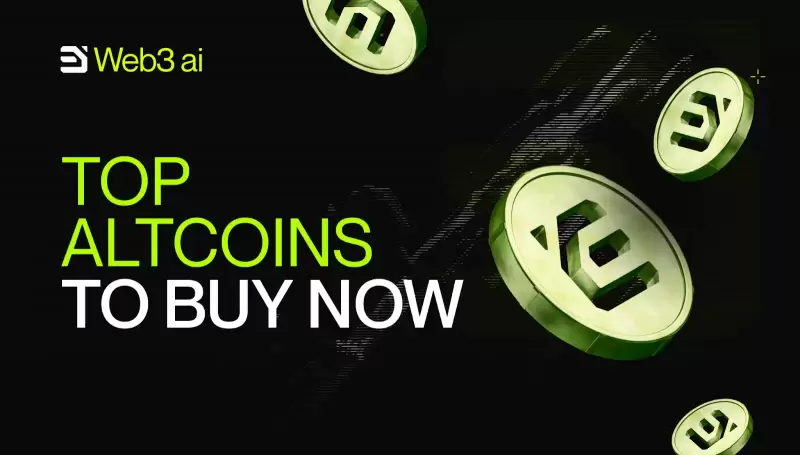 |
|
 |
|
 |
|
 |
|
 |
|
 |
|
 |
|
 |
|
 |
|
 |
|
 |
|
 |
|
 |
|
 |
|
 |
|
Cryptocurrency News Articles
Bitcoin vs. XRP: Which Cryptocurrency Will Emerge as the Dominant Force?
Mar 21, 2025 at 11:30 am
While Bitcoin aims for $200,000 by the end of 2025, XRP is emerging as a strong contender for institutional investment.

While Bitcoin is often viewed as a leading contender in the institutional crypto landscape, another cryptocurrency is emerging as a strong competitor: XRP.
Both cryptocurrencies are vying for dominance, each presenting unique strengths that could sway institutional interest.
Analysis from Scott Melker’s firm suggests that Bitcoin’s growing role in the financial sector gives it an edge. However, XRP’s focus on real-world payment solutions presents a compelling alternative for institutions.
Despite the ongoing sustainability debates surrounding Bitcoin, XRP’s recent price surge shows the market interest in the cryptocurrency and its unique capabilities could attract institutional investment, presenting a challenge to Bitcoin’s current lead.
Bitcoin: Strategic Reserve vs. XRP’s Utility
Bitcoin’s acceptance as a strategic reserve asset is increasing globally, with institutions recognizing its decentralized and trustless nature.
However, XRP is concentrating on providing efficient and low-cost cross-border payment solutions, an area where Bitcoin has limited activity.
While some might value XRP’s token price more highly, its practical financial application is significant for institutions, especially considering the skepticism surrounding crypto valuations.
Bitcoin’s role as a store of value contrasts with XRP’s focus on swift and inexpensive transactions facilitated by the Ripple network, offering a compelling proposition beyond just holding digital assets.
Blockchain: Bitcoin’s Settlement Focus vs. XRP’s Transactional Speed
In essence, a blockchain is a settlement ledger, highlighting Bitcoin’s appeal for tasks such as settling trades or cross-border transactions.
On the other hand, XRP uses the XRP Ledger for rapid and inexpensive transactions, aiming for a high volume of transactions.
This difference could sway institutions that prioritize payment processing over secure settlement, rendering XRP a more attractive option due to its real-world payment utility and ability to handle a large throughput of transactions.
Bitcoin’s Track Record vs. XRP’s Disruption Potential
Having operated without downtime for 15 years, Bitcoin boasts a strong track record, a factor that financial professionals value.
However, XRP, backed by Ripple, has been actively forging partnerships with financial institutions around the world, showcasing its potential to disrupt traditional payment systems.
While Bitcoin’s reliability is a plus, XRP’s proactive approach to real-world integration presents a significant competitive advantage as institutions seek to improve existing financial infrastructure.
Michael Saylor’s Bitcoin Advocacy vs. Ripple’s Institutional Partnerships
Industry leaders like Michael Saylor have been influential in driving institutional adoption of Bitcoin, highlighting its potential in the macroeconomic sphere.
Conversely, Ripple has focused on building direct relationships with financial institutions, showcasing XRP’s capabilities for improving payment infrastructure and presenting tangible benefits to institutions.
While Bitcoin benefits from vocal advocates, XRP’s tangible partnerships offer a concrete path to institutional integration and potential challenge to Bitcoin’s dominance.
Bitcoin: The ‘Internet of Value’ Awaits Broader Use, While XRP Builds Payment Rails
Bitcoin’s value proposition as a trustless settlement system is compelling, but XRP’s strength lies in its ability to operate as a fast and cost-effective payment network, minimizing reliance on traditional banking intermediaries for transactions.
This difference could be crucial as central banks around the world consider launching digital currencies, presenting a competitive landscape where XRP’s established payment infrastructure and integration with financial institutions could give it an edge over Bitcoin, which is often viewed as a store of value.
Disclaimer:info@kdj.com
The information provided is not trading advice. kdj.com does not assume any responsibility for any investments made based on the information provided in this article. Cryptocurrencies are highly volatile and it is highly recommended that you invest with caution after thorough research!
If you believe that the content used on this website infringes your copyright, please contact us immediately (info@kdj.com) and we will delete it promptly.
-

- Ethereum (ETH) price shows signs of a possible recovery as on-chain data and technical indicators point to a change in momentum.
- Apr 22, 2025 at 01:50 pm
- While the broader market remained cautious, Ethereum's weekly price structure holds above key support levels. At the same time, large ETH holders continue to accumulate
-

-

- Mutuum Finance (MUTM) Captures the Attention of the Crypto Community, Drawing Comparisons to Early-Stage Successes Like Ripple (XRP)
- Apr 22, 2025 at 01:45 pm
- Mutuum Finance (MUTM) is rapidly capturing the attention of the crypto community, drawing comparisons to early-stage successes like Ripple (XRP) and Pepe (PEPE).
-

- Paul Atkins officially sworn in as the 34th chairman of the US Securities and Exchange Commission.
- Apr 22, 2025 at 01:45 pm
- Paul Atkins has officially been sworn in as the 34th chairman of the US Securities and Exchange Commission. The April 20 announcement comes nearly two weeks after Atkins' position was confirmed by the US Senate in a 52-44 vote on April 9.
-

-

- Bitcoin (BTC) May Soon Mirror Gold's Price Trajectory, Setting Up a $450,000 Target by Year-End
- Apr 22, 2025 at 01:40 pm
- While gold continues to set new all-time highs (ATH), trading at $3,420 per ounce, Bitcoin (BTC) may soon follow the precious metal's price trajectory, according to crypto analyst Master of Crypto.
-

-

-




























































